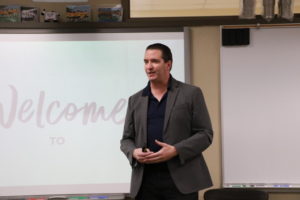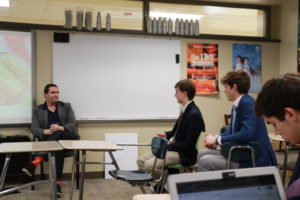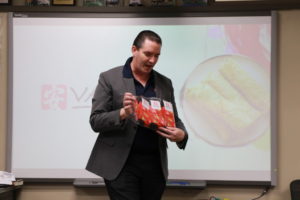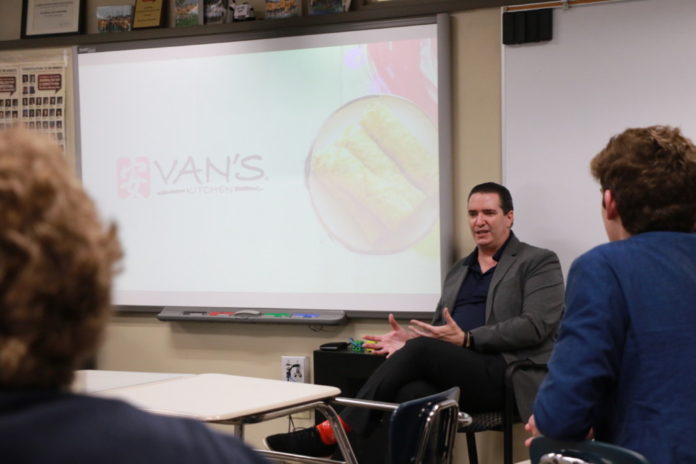The food industry is arguably one of the hardest industries to sell a product. While the producer has to make sure the product is aesthetically appealing and cheap, they also must ensure the food tastes as good as it looks. Considering how picky most Americans are about their food, achieving both benchmarks can be incredibly difficult to pinpoint.
One such business trying to set themselves apart in the egg roll industry is Van’s Kitchen. The private company sells high-quality egg rolls in supermarkets nationwide, embracing a small-footprint and familial perception.
On Tuesday, January 14, 2020, The Roundup and Jesuit’s Entrepreneurship Club had the opportunity to sit down and talk with Carl Motter, a Jesuit alum and the Chief Sales Officer at Van’s Kitchen.
Mr. Motter’s Background
Mr. Carl Motter graduated from Jesuit Dallas in 1985 and attended the University of North Texas, receiving a degree in business, management, and marketing. Mr. Motter has been working at Van’s Kitchen for twenty-three years, a job which is not what he thought he would be doing back when he was in high school. He stated that he originally intended on pursuing computer science, and he did freelance computer work in the early part of his career.
Mr. Motter said that one night at dinner with his father then, he jokingly claimed he could be a better salesperson than someone who had been doing sales for a long time. He said that his first real job with Van’s was working as a general contractor, working with Mr. Van in turning the company’s newly bought building into a processing facility. He managed the purchasing, trading, and upkeep of the building until it was transformed into a processing plant. Following the completion of the building, he was told by Mr. Van to work in the plant to get experience, buying all the food and packaging material and essentially heading the purchasing department of the business.
Up until around five years ago, Mr. Motter explained how he really was running the purchasing side of the business. He said that he focused a lot on whether the food will make people feel “healthy and wholesome or make them sick.” At this point, food safety got intertwined with the food purchasing aspect. Mr. Motter said at this point in his career he felt like an “egg roll scientist.” He explained, “I really had to understand the chemistry and the interactions of the ingredients of what we were buying.”
Five years ago, Mr. Motter said the company moved positions around, transitioning him from running purchasing, IT, and procurement to leading the sales department which he does to this day.
History of Van’s Kitchen
Theresa’s, Mr. Motter’s wife, parents, Van and Kim, grew up in Vietnam, wanting to pursue a better life through the American Dream. The family moved to Dallas, Texas in 1986 and began Van Oriental Food, working nonstop to build a high-quality brand. As the brand continued to grow, Mr. Motter said he joined the company which was making good progress, even receiving checks and opportunities from major companies such as Albertson’s-Safeway.

Growing a business in a time where women and immigrants had a much harder time achieving success, Theresa overcame many of the obstacles to make sure that Van’s egg rolls were on the shelves of every supermarket across the United States. As Mr. Motter said, “the Van Oriental Food family broke through barriers and found themselves fulfilling their dream.”
Van’s Vision and Values
As Mr. Motter told the students at the meeting, Van’s Kitchen’s vision is to “honor God and provide honest food to feed our communities with love.” The mission of Van’s Kitchen is that “every bite counts.” Mr. Motter described this motto by saying, “every year we make millions of egg rolls, but people eat them one bite at a time. Every bite counts because every life counts.” They want to use their egg rolls to make sure that every life counts and is fulfilling. From the suppliers to the consumers, Mr. Motter described that everyone is made to love. Mr. Motter said in order to honor and love all those eat their egg rolls and are involved in the process, there are three fundamental principles Van’s Kitchen follows…
We Nourish – Mr. Motter stated, “God made all people to be loved and when we share his love with others while walking in his purpose for us, we deliver quality food made with whole ingredients. We nourish families by providing easy to prepare snacks and meals that are nutritious and flavorful. Nourishing means feeding the body with food and feeding the soul with hope. To be stronger we feed her in love with every bite so she can grow up and fulfill her purpose.”
We Bring People Together – “Great food brings people together. Relationships are strengthened when that happens and strong relationships create strong people. We believe there is room at the table for everyone. That table can be the dinner table, the table of opportunities as well. There is room for all: male, female, young, old, and all nationalities. If you work hard, you can overcome all challenges and fulfill your dreams.”
We Empower – “We empower outsiders, underdogs, and the least of these to rise up, conquer challenges, and fulfill their dreams. Van’s Kitchen story is powerful. Theresa’s parents dreamed big. They had to work hard to overcome obstacles and achieve these dreams. We use our story and our brand to empower women and immigrants to succeed. We believe God made all people to be loved and when we share his love with others, we are walking in His purpose for us. We know that building this business is our purpose in life. We love what we do, and we love the opportunities to work together to make egg rolls that people love.”
Q & A
Given the high failure rate of restaurants and other food businesses, what do you credit to Van’s Kitchen’s success?
We are not really in the restaurant industry, but the failure rate of restaurants is similar to other fields. We did not know what we didn’t know. We were in a pretty young industry. So Asian food at the time when we started was fairly unique. It was not mainstream in the United States. We had a lot of opportunities to write our own path and educate people.
One of the funny stories we would tell is when they started doing presentations to places like Albertsons, they would bring these eggrolls to a buyer and typically it would be someone like me: an older white male who is like, “what is that?” Today when I walk into a client meeting, they are not asking me what it is, they are asking what ethnicity is this from? Why is ours different? Why is it not ubiquitous to the market? Why is it not just commonplace?
The whole level of awareness is different. The barriers to entry and what we had to do to succeed were much lower back then. I hate to say it, but modern food safety wasn’t around when I started. We didn’t have things like lot controlled food. We did not look at the shelf life of ingredients. As long as it doesn’t kill people, you’re fine!
 As we started to make product, I think the tenants that always stood us well were that we never were afraid to fail. The most important thing was that when we made mistakes, we always admitted them. And we never took the easy route and said “well, maybe this batch isn’t as good. Who can we sell that to?” If it wasn’t good enough for us, it didn’t leave the plant. If I wouldn’t feed it to my family, why would I feed it to someone else’s?
As we started to make product, I think the tenants that always stood us well were that we never were afraid to fail. The most important thing was that when we made mistakes, we always admitted them. And we never took the easy route and said “well, maybe this batch isn’t as good. Who can we sell that to?” If it wasn’t good enough for us, it didn’t leave the plant. If I wouldn’t feed it to my family, why would I feed it to someone else’s?
So, the commitment to that quality, to doing it right, not to do it easy, not to do it cheap, and owning up to mistakes and saying “we are not proud of this” is [a key to success]. The other thing that we do that we call charitable defects. Its egg rolls that aren’t pretty; they are perfectly good to eat, they just aren’t pretty. Whatever is leftover, we donate to the food bank. We’ve done that forever. We don’t sell “seconds” which is what charitable defects would be. We could. It would make money and would make the PNL (Profits and loss) look better. Our commitment to feeding the community is they are good enough to eat and good enough to sell so we want the best. We donate everything that we don’t actually consume. Still, I challenge the ops team still to get the defects down.
Compared to large companies like PF Changs, what is your competitive advantage?
Almost all of our competitors are multinational corporations. They are big. They have a lot of resources. They have a lot of people. But they don’t really have that commitment to something greater than just what the organization is doing. You get pockets of it and people who do cool consulting things. There are a lot of great companies out there, don’t get me wrong, but in the food space, you don’t normally see a lot of people winning Malcolm Baldrige Quality Awards for quality and things like that. So its really we like who we are. We like being a big-middle sized company. We are not so big that it is bureaucratic. We are small enough that we are team focuses. If you have a problem, it probably relates to something I deal with with the clients. My vested interest is that every team member I work with is my success depends on theirs. So my job is to make them successful.
With the Jesuit Entrepreneurship Club having started a company recently in the early stages of development, from a sales perspective, what do you think has fueled the success of Van’s Kitchen in that facet?
I would say that you have to find who your core client will be. And you have to be willing to fix problems that they have. If you can’t do that, you really are of no service to them and of no value to the. The thing that you are selling is really the vehicle to help them solve their problems.
Know your competition. Who are you up against? What competitive advantages do you  offer? Do you have better expertise or can you rent it or can you tap into it? Are you more nimble? If you have no name credibility, can you partner with someone who will give you a referral? Perhaps you can give a discount so that you can try it with them, and they will give you the endorsements you are looking for for free. It should be a win-win for them: they get a tangible good or service done well at a better price than they would have had.
offer? Do you have better expertise or can you rent it or can you tap into it? Are you more nimble? If you have no name credibility, can you partner with someone who will give you a referral? Perhaps you can give a discount so that you can try it with them, and they will give you the endorsements you are looking for for free. It should be a win-win for them: they get a tangible good or service done well at a better price than they would have had.
As a business, one of the biggest killers in the first few years is cash flow. If you’re not selling product, but you’re having to pay people and buy inventory, that’s the biggest struggle that most people have.
What are Van’s Kitchen’s future plans for growth?
We have a three-year strategic growth plan we have rolled out with the company. Everyone will help pick how we accomplish these three major goals. And the first major goal is to dominate the eggroll market. How we do that will be up to the “roll” models, and I and the key leaders will help guide those discussions. We have been on a growth trajectory, and it is almost as hard to manage growth as it is when yields are slow. In our world, manufacturing is like a train, they are big and heavy and they take a long time to get up to speed and once they do, you do not want to change that speed quickly because if you do, bad things happen. You can’t speed them up fast, and you can’t slow them down fast. You’ve got all that momentum.
So in manufacturing, you want that cadence of I don’t want downtime, and I don’t want my workers working crazy one week and being off the next week. Life does not work on a nice, smooth line, and growth doesn’t work on a controlled curve. It goes in fits and starts. You just have to be able to adapt to that. Plan as much as you can and just be prepared that what you thought you were going to do today may not what you are doing tomorrow because the market may change, your situation may change. But really in business, the constant is change. So, if you are not ok with it, you’re in the wrong field. If you can’t handle and adapt to constant change at some level, you will eventually be obsolete or someone else will figure out how to do it better even if you have the best plan today. There is always somebody out there willing to work harder. You have to constantly stay ahead of that curve because it is not only things outside of your control, but it may also be things that you are doing that make your obsolete.
How do you think the Jesuit education and values influence how you conduct business now?
When I was here, I was required to take a class called “Music and Art Appreciation.” Whatever form that morphed into, I hated it. We are learning about painting, and I did not like art. I wanted nothing to do with it. However, when I left, somehow I ended up liking it and appreciating it. I’m considered to be one of the more aesthetic people in our company, so the fact that I lead sales and marketing kind of helps. When I see things like this I go, “I like it. It looks good.” I can’t do it, but I know what I like, and I know what I don’t like. The appreciation for the well-roundedness of not just being stuck with the idea that I want to be a computer science major and all I really need to know is math and computers.
As a business owner, knowing other things matters because if you can’t hire somebody to do it, then in some ways as a young entrepreneur you’re doing a lot of it. When we first started, I wasn’t the salesperson. I was a general contractor. I’ve laid black iron pipe. I’ve laid rebar. I’ve smoothed concrete. I’ve almost fallen off of large structures, stupidly. I didn’t go to school for that, but I was sitting there going, “oh my gosh, what am I doing here.” It was just another challenge and was something to do. It was something I thought I could be good at if I put my mind to it.
Being well-rounded in business means don’t just understand one sole discipline. Yes, I got a degree in marketing, but I’m probably much better at reading accounting profit and loss statements, our balance sheet, our income statement. It is vital to our business and vital to me in the role of sales. Our job is to sell profitably. It is not just to sell.
When I first started, Mr. Van said, “I’ve got one question that will help you to understand if you’re a salesperson.” I said, “what’s that?” He goes, “are you a monkey?” And I was like, “what does a monkey have to do with it?” And he goes, “I can give a monkey egg rolls and he can go pass them out.” That’s basically selling at no profit. So he goes, “your job is to go out and sell at a profit. So either you’re a salesperson or your a monkey.” I kind of always remembered that, but I never really got my degree in sales either.

So my whole career was being a buyer. If you know much about the relationship between buyers and sellers, buyers generally hate salespeople and sellers think buyers are out there to get things at the lowest price and take advantage of them. It’s kind of this love-hate relationship. When I jokingly said I’ll take on sales, my boss asked what did I need to do that. I told him I guess I have to learn how to be a salesperson. I was cringing inside because that’s not what I really want to do. I was lucky that we had some really good business advisors who said, “I know a company. You need to go talk to them. They can help you out.”
So the first thing they did was put me in this room with about sixty people. They were folks from all different levels: VP of sales running different departments, a couple of guys run multimillion-dollar corporations, and they pull me up in front of the whole group and the guy running it asks, “tell me what you’ve done for the last twenty-four years.” And I told him I was a buyer, and he goes, “he’s perfect! He’s going to be the best salesperson out of this whole group.” What he said made sense: “you talk to buyers the way they think. You look at things the way they look at it.” You never would walk in and say, “Hey, can you just buy this from me?” That’s not the relationship I’ve had with clients and that’s not the relationship that lasts a long time. If you go in and sell out from under your competition, you really aren’t adding value.
How do you incorporate social media into getting Van’s Kitchen out to consumers?
What we started with was what we would call a social presence. People who see the product in the store and bought it and want to know a little more, we got a webpage. We have landing pages. We can educate. We can inform. And we are interactive to a certain extent. As it has grown, we have kind of looked at what makes sense to add on. We didn’t jump into every single social media channel. Our core demographic is female, probably in the 30s-80s range. The bigger part of that is solidly Facebook users. Some Pinterest. Facebook’s really it. So we started there thinking they can go to our website, but they can go to our Facebook and we can talk to them.
For us, our bigger spend is for me to reach clients like me. They are the people and the buyers at the Albertsons and Walmarts who say, “I’m going to put your item in, and I can put it in four-thousand stores.” So really supporting that part of it is what drives the number. If we are not in the stores that people go to, we’ve lost the battle already.

You can visit the Van’s Kitchen webpage here. A big thank you to Mr. Motter for taking time out of his busy day to speak with The Roundup and Jesuit Entrepreneurship Club!
Stay tuned to The Roundup for more alumni profiles and club activities!






